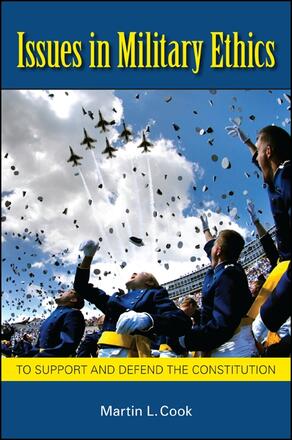
Issues in Military Ethics
To Support and Defend the Constitution
Alternative formats available from:
Reflections on, and analysis of, ethical issues facing military service in the United States.
Description
Reflecting on a seventeen-year career teaching at military educational institutions of the Air Force, the Army, and the Navy, Martin L. Cook finds a powerful but underappreciated basis for military ethics in the oath to the Constitution that members of the armed services pledge. In Issues in Military Ethics, Cook considers the role of airpower in counterinsurgency war and the place of robotic weapons systems on the battlefield, but he also looks beyond ethics in the conduct of war to issues arising in military life generally. He addresses a range of other issues with pressing contemporary relevance, including civil-military relations, ethics education, and religion, in particular the ascendency of evangelical Christianity in military culture. This volume serves as an important resource for scholars, members of the armed services, and educators alike.
Martin L. Cook is Admiral James Bond Stockdale Chair of Professional Military Ethics at the United States Naval War College. He is the author of several books, including The Moral Warrior: Ethics and Service in the U. S. Military, also published by SUNY Press.
Reviews
"Overall, this book should be mandatory reading for those in uniform … Readers will not agree with all of Cook's arguments, but that is not the point. Professional military ethics is to be engaged—consistently—over the course of one's time in uniform. In one book, Cook raises often ignored debates and tensions confronted by both junior and senior leaders. It is the sort of text one will return to repeatedly over time. " — Journal of Military Ethics
"The U. S. military is one of the most trusted institutions in American society. Martin Cook takes us inside the professional military establishment to examine the most contested ethical debates of the post-9/11 era. His candor and rigor reveal deep sources of American power: the virtues of reason and openness, and the capacity for self-correction. This book is an example of how moral argument has served our country and the world. It should be read by all who seek to understand the moral foundations of war, peace, and democracy in the early twenty-first century. " — Joel H. Rosenthal, President of the Carnegie Council for Ethics in International Affairs
"In this valuable book, Martin Cook brings to bear both his academic background in the study of philosophical, theological, and historical perspectives on ethics and the insider's understanding of issues in military ethics he has gained through his years of teaching and interacting with American military professionals. This special combination of Cook's experience and knowledge give him a rare perspective and understanding not only of what the important issues are today but how they have become so and how to think meaningfully about them. " — James Turner Johnson, author of Ethics and the Use of Force: Just War in Historical Perspective